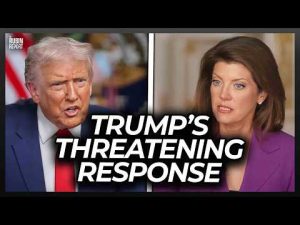In a world where government shutdowns seem to have become the norm rather than the exception, the latest news from the nation’s Energy Department might just make everyone sit up a little straighter. With contract workers dedicated to safeguarding our nuclear arsenal now facing furloughs, concerns are rising about the immediate impact this could have on national security. The government shutdown, stretching beyond a month, has left the department scrambling to keep safety and security measures in place while halting the modernization efforts of our nuclear stockpile.
Now, anyone might think that safeguarding a nuclear arsenal should take priority over pointless political games, but apparently, that’s a point lost on certain lawmakers. With the allocated funds all but exhausted, further budgetary gymnastics are no longer a viable option, prompting an inevitable slowdown in nuclear modernization projects. It’s a rather frustrating state of affairs, as this stagnation is delaying necessary advancements intended to keep America at the forefront of military power worldwide.
Recently, the President made an eyebrow-raising announcement about restarting nuclear weapons testing, aiming to reassure the world that the United States intends to maintain its superpower status. It’s as if others need constant reminders that America always leads from the front. The governing approach shows a clear intent to not only maintain but also showcase dominance, both at home and abroad. But with a standoff in funding priorities, it’s unclear how effective this strategy can be without the full cooperation of Congress.
Let’s not forget that this is all happening in the backdrop of an administration dedicated to lowering energy prices and modernizing nuclear arsenals. The Energy Secretary, once hailed as a sought-after executive genius, must now redirect his genius towards overcoming the impediments of furloughs and freezing governmental functions. While dusty old weapons sit around waiting for updates, new non-nuclear system tests promise a future as secure as the past was extravagant.
Though it has been decades since the U.S. conducted a full-blown nuclear test—back when floppy disks were still cutting-edge—the country seems quite confident about its current nuclear capabilities. Thanks to advanced simulations, the United States stands ahead with a significant advantage over adversaries when it comes to nuclear design. The U.S. leveraging artificial intelligence to simulate nuclear tests showcases a blend of technology and military might that—provided political hurdles don’t get in the way—continues to keep the nation at the leading edge of innovation.
All in all, the scenario reflects a balancing act of political will and national defense necessities—a shameful testament to the notion that even nuclear security can become a pawn in the grand chess game called Washington politics. While advances in energy and technology continue to make headlines, it is crucial that the government swiftly resolves the impediments that these furloughs represent. Surely, a superpower should not have to make national security decisions on a shoestring budget, and certainly not with political gridlock being the only cause of delay.







